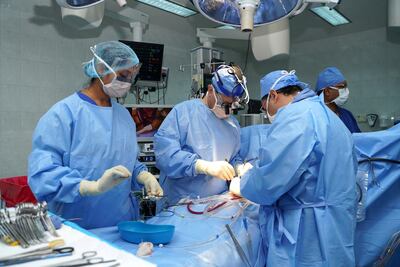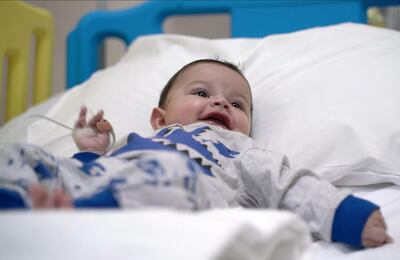Parents caring for newborn babies awaiting operations for heart defects are receiving increased support under an Abu Dhabi healthcare initiative that aims to boost survival rates.
Abu Dhabi's public health provider, Seha, began an interstage monitoring programme dedicated to babies with serious abnormalities, such as when only one side of a child's heart is functioning.
Such conditions typically require open-heart surgery in the first few days of life, followed by a second heart operation after six months.
In this crucial time between operations, known as the interstage period, about 20 per cent of babies die.

It is a stark statistic that a group of cardiac intensive care physicians, nurses and administrative employees from Seha-affiliated Sheikh Khalifa Medical City seek to address by providing parents with comprehensive monitoring and medical counselling during the most significant of times in their child's life.
"Newborns face a higher risk of death during the interstage period, due to the increased toll a simple virus or other infections can have on an abnormally developed heart," said Dr Anwar Sallam, chief medical officer at Seha.
"With parents not knowing what to watch out for, and how rapidly a newborn with a heart abnormality’s health can deteriorate, the SKMC paediatric cardiac surgical department have taken the lead in introducing a programme that enables the continuous monitoring and care of infants at home during the waiting period.”
The paediatric congenital cardiac team at the hospital look after 50 to 60 newborns with these conditions every year.
The IMP team monitors the infant’s well-being from the time they complete their first open-heart surgery to the day they are readmitted for their second procedure.
The team then establishes regular contact with the family through either daily or weekly telemedicine consultations.
If problems are identified, families are given instructions on how to proceed, and if the situation becomes critical, arrangements are made for referral to hospital and readmission.
"Of the approximately 350 corrective heart surgeries we perform on children each year, around 60 infants require a follow-up open-heart procedure after around six months," said Dr Victoria Sheward, consultant paediatric cardiac intensivist at the hospital.
"By introducing the interstage monitoring programme, we are letting parents know they are not alone during this journey and are providing them with the support they need to keep their newborns safe, healthy and alive as they wait for their second operation.”
The programme was established by the hospital in July last year and currently has close to 30 infants enrolled for home monitoring.
To date, three of them were identified as nearing critical condition because of their declining health, with urgent intervention arranged through the programme.
A mother's gratitude after life-saving intervention
Rayan was born in June 2020 with a severe heart abnormality, in which the whole of the right side of his heart had not developed properly.
His condition meant that he needed life-saving open-heart surgery within the first few weeks of life, which was carried out at SKMC in July.
After a prolonged stay in the paediatric cardiac intensive care unit, Rayan returned home at the end of the month.
“Rayan is my first baby. SKMC doctors diagnosed a congenital heart defect, so he underwent an initial open-heart surgery in his first few days of life during Covid-19, followed by a second heart surgery on December 15 after six months," said his mother, Aya.
"It was one of the toughest times of my life, as my parents were away from me in Syria, but the SKMC team was very supportive and took care of my baby by making continuous follow-up calls.”

